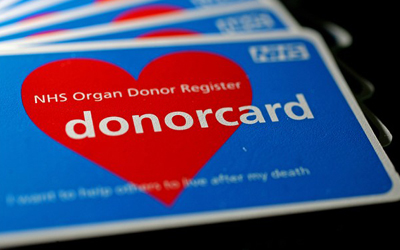 The Faculty welcomes the award to Matthew Dyson, Kourosh Saeb-Parsy (of Addenbrooke's Hospital and Fitzwilliam College) and Kathy Liddell, of a Philomathia Forum award to continue their work on how to regulate organ transplants which transmit disease.
The Faculty welcomes the award to Matthew Dyson, Kourosh Saeb-Parsy (of Addenbrooke's Hospital and Fitzwilliam College) and Kathy Liddell, of a Philomathia Forum award to continue their work on how to regulate organ transplants which transmit disease.
A shortage of suitable organs and the growing number of patients dying on transplant waiting lists have necessitated increasing use of less-than-ideal organs from deceased donors. This includes organs from older donors or those with co-morbidities, infections, current or previous cancers or history of high risk behaviour such as smoking, excessive alcohol and illicit drug use. The outcomes from transplantation of such 'suboptimal' organs are generally acceptable for the patient population compared to the even greater risk of death while waiting for an organ. However, compared to optimal organs, transplantation of sup-optimal organs exposes individual patients to greater risk of transmission of disease and major morbidity, graft loss or death. This necessitates the development of effective approaches that address not only the medical and ethical issues, but also the fundamental legal regulation of suboptimal organs.
The support from the Philomathia Forum will enable a workshop in Cambridge, bringing together medical specialists from around the UK with legal experts for two aims:
1) To examine how UK law currently governs transplantation of suboptimal organs and explore its implications for clinicians and patients. We will focus on two key relevant actions in tort: negligence and product liability. A cross-cutting question is the impact a patient's awareness of risks, and his or her informed consent to those risks, has on liability in both areas of tort law. For example, does the definition of "a product" in product liability include "an organ" as has been argued by some, and if so, why? What will that mean for patients, doctors, hospitals and the NHS more broadly?
2) To develop responses to the policy-related issues that follow from the above medico-legal analysis.
The proposed workshop builds on recent joint work by the applicants published in the Lancet (2015; 386: 719-21). It would also support on-going scientific and clinical research in the Department of Surgery, and legal research on-going in the Centre for Law, Medicine and Life Sciences (LML).
Please contact mnd21@cam.ac.uk

 Facebook
Facebook  X/Twitter
X/Twitter  Instagram
Instagram  YouTube
YouTube  Flickr
Flickr  LinkedIn
LinkedIn